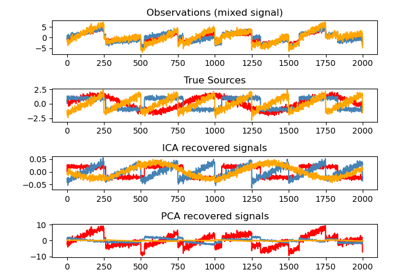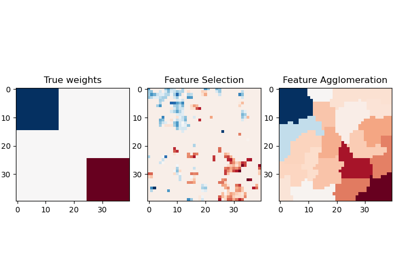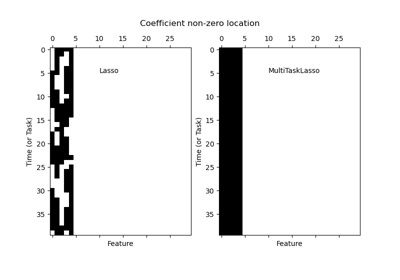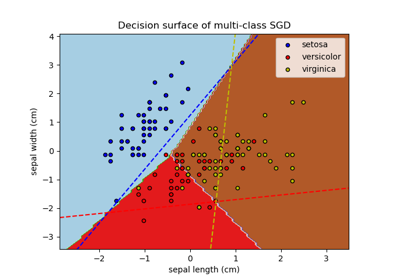Note
Go to the end to download the full example code or to run this example in your browser via JupyterLite or Binder.
Orthogonal Matching Pursuit#
Using orthogonal matching pursuit for recovering a sparse signal from a noisy measurement encoded with a dictionary
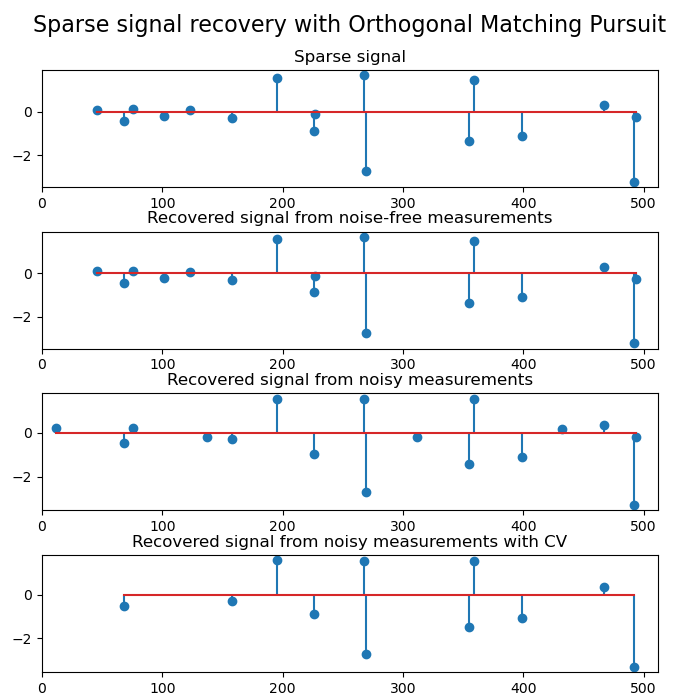
# Authors: The scikit-learn developers
# SPDX-License-Identifier: BSD-3-Clause
import matplotlib.pyplot as plt
import numpy as np
from sklearn.datasets import make_sparse_coded_signal
from sklearn.linear_model import OrthogonalMatchingPursuit, OrthogonalMatchingPursuitCV
n_components, n_features = 512, 100
n_nonzero_coefs = 17
# generate the data
# y = Xw
# |x|_0 = n_nonzero_coefs
y, X, w = make_sparse_coded_signal(
n_samples=1,
n_components=n_components,
n_features=n_features,
n_nonzero_coefs=n_nonzero_coefs,
random_state=0,
)
X = X.T
(idx,) = w.nonzero()
# distort the clean signal
y_noisy = y + 0.05 * np.random.randn(len(y))
# plot the sparse signal
plt.figure(figsize=(7, 7))
plt.subplot(4, 1, 1)
plt.xlim(0, 512)
plt.title("Sparse signal")
plt.stem(idx, w[idx])
# plot the noise-free reconstruction
omp = OrthogonalMatchingPursuit(n_nonzero_coefs=n_nonzero_coefs)
omp.fit(X, y)
coef = omp.coef_
(idx_r,) = coef.nonzero()
plt.subplot(4, 1, 2)
plt.xlim(0, 512)
plt.title("Recovered signal from noise-free measurements")
plt.stem(idx_r, coef[idx_r])
# plot the noisy reconstruction
omp.fit(X, y_noisy)
coef = omp.coef_
(idx_r,) = coef.nonzero()
plt.subplot(4, 1, 3)
plt.xlim(0, 512)
plt.title("Recovered signal from noisy measurements")
plt.stem(idx_r, coef[idx_r])
# plot the noisy reconstruction with number of non-zeros set by CV
omp_cv = OrthogonalMatchingPursuitCV()
omp_cv.fit(X, y_noisy)
coef = omp_cv.coef_
(idx_r,) = coef.nonzero()
plt.subplot(4, 1, 4)
plt.xlim(0, 512)
plt.title("Recovered signal from noisy measurements with CV")
plt.stem(idx_r, coef[idx_r])
plt.subplots_adjust(0.06, 0.04, 0.94, 0.90, 0.20, 0.38)
plt.suptitle("Sparse signal recovery with Orthogonal Matching Pursuit", fontsize=16)
plt.show()
Total running time of the script: (0 minutes 0.167 seconds)
Related examples
